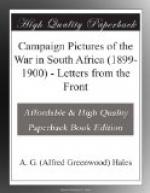All that fateful day our wounded men lay close to the Boer lines under a blazing sun; over their heads the shots of friends and foes passed without ceasing. Many a gallant deed was done by comrades helping comrades; men who were shot through the body lay without water, enduring all the agony of thirst engendered by their wounds and the blistering heat of the day; to them crawled Scots with shattered limbs, sharing the last drop of water in their bottles, and taking messages to be delivered to mourning women in the cottage home of far-off Scotland. Many a last farewell was whispered by pain-drawn lips in between the ringing of the rifles, many a rough soldier with tenderest care closed the eyes of a brother in arms amidst the tempest and the stir of battle; and above it all, Cronje, the Boer general, must have smiled grimly, for well he knew that where the Highland Brigade had failed all the world might falter. All day long the battle raged; scarcely could we see the foe—all that met our eyes was the rocky heights that spoke with tongues of flame whenever our troops drew near. We could not reach their lines; it was murder, grim and ghastly, to send the infantry forward to fight a foe they could not see and could not reach. Once our Guards made a brilliant dash at the trenches, and, like a torrent, their resistless valour bore all before them, and for a few brief moments they got within hitting distance of the foe. Well did they avenge the slaughter of the Scots; the bayonets, like tongues of flame, passed above or below the rifles’ guard, and swept through brisket and breastbone. Out of their trenches the Guardsmen tossed the Boers, as men in English harvest fields toss the hay when the reapers’ scythes have whitened the cornfields; and the human sheaves were plentiful where the British Guardsmen stood. Then they fell back, for the fire from the heights above them fell thick as the spume of the surf on an Australian rock-ribbed coast. But the Guards had proved to the Boers that, man to man, the Briton was his master.
In vain all that day Methuen tried by every rule he knew to draw the enemy; vainly, the Lancers rode recklessly to induce those human rock limpets to come out and cut them off. Cronje knew the mettle of our men, and an ironic laugh played round his iron mouth, and still he stayed within his native fastness; but Death sat ever at his elbow, for our gunners dropped the lyddite shells and the howling shrapnel all along his lines, until the trenches ran blood, and many of his guns were silenced. In the valley behind his outer line of hills his dead lay piled in hundreds, and the slope of the hill was a charnel-house where the wounded all writhed amidst the masses of the dead; a ghastly tribute to British gunnery. For hours I stood within speaking distance of the great naval gun as it spoke to the enemy, and such a sight as their shooting the world has possibly never witnessed. Not a shell was wasted; cool as if on the decks of




